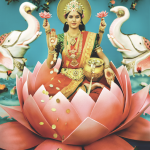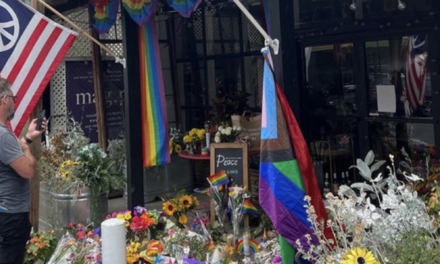By Ryan Michaels
The Birmingham Times
When artist Manjari Sharma was growing up in Mumbai (formerly called Bombay) on India’s west coast, she and her siblings found themselves going to temples for religious services, sometimes excited and sometimes “dragging our feet for something that mom and dad wanted to do,” she recalled.
“My mom would be like, ‘Oh, I’ve heard about this really incredible temple in this odd part of India,’ and it was added into the list of places [our family] would visit as road-trippers,” Sharma said. “Other times, it was the familiar temple around the corner because it was a special occasion during the year, and we were going for it.”
The experience of attending those services was dramatic and involved all the senses, the artist said: “You heard chants, and you could smell the incense wafting. … Usually, the deity or the sculpture was kind of veiled in some way and then there was like a big reveal. … At that moment, you’re either having a darshan or not.”
“To See And Be Seen”
“Darshan” is a Sanskrit term meaning sight, in the Hindu sense of beholding a deity and making an immediate spiritual connection. Overwhelmingly in India, Hindu gods and goddesses are rendered in paintings or sculpted from stone and clay.
Those experiences of her youth all influenced Sharma as an artist, whose vibrant renderings of nine Hindu deities will be on display alongside several ancient depictions of those gods and goddesses and videos of southern Asian religious festivals at the Birmingham Museum of Art (BMA) in a new exhibition—“Expanding Darshan: Manjari Sharma, To See and Be Seen,” which will run from March 18, 2022, through Jan. 15, 2023.
The exhibition, which is free, focuses on art from the religious practice of darshan, a concept mostly popular in religious populations in southern Asia. The centerpiece of the exhibit, Sharma’s photo series, was painstakingly arranged from 2011 to 2013. The shots, based on the long history of works depicting Hindu deities, are portraits of human subjects adorned with makeup, clothing, jewelry, and props, all handmade by a team of set and prop builders, makeup artists, art directors, carpenters, painters, jewelry experts, and assistants.
The Hindu goddesses Durga, Kali, Lakshmi, and Saraswati are all present in the series, as well as the gods Brahma, Ganesh, Hanuman, Shiva, and Vishnu. The BMA is the only institution to have the entirety of the Darshan series in its collection. All of the featured works, many of which have never been displayed to the public, are from the museum’s own collection. The project was funded through a campaign on the crowdfunding website Kickstarter after Sharma created the first image, the portrait of Lakshmi, with her own money.
Katherine Paul, the BMA’s curator of Asian art, said Sharma’s photo series features many aspects that were absent from the museum’s permanent collection, including “vibrant color, contemporary component, architectural aspects, … as well as the phenomenal story of collaboration and creation of the works.”
“Endless Source of Wisdom”
Though Sharma is interested in the stories of these gods and goddesses, she does not describe herself as a religious person.
“My interest in all of these deities is to, in a way, affirm human imperfection because, when you’re looking at a deity, that’s ultimately the power of another human being looking back at you,” she said. “That makes this idea of God much more relatable to me, someone who’s flawed and trying their best.”
One goddess the photographer feels a consistent “sense of belonging” is with Saraswati, the goddess of art, music, and education.
“I feel like that’s pretty much the trifecta that brought me to another country, a combination of things that continue to keep on giving, like an endless source of wisdom that pretty much makes me tick as a human being. … She also has a great sense of peace about her,” said Sharma, 42, who moved to the United States when she was 21 and now lives in Los Angeles, California.
Sharma titled the series of photos “Darshan,” in reference to the religious practice. While the word often refers to the mere viewing of a deity or holy person in southern Asian religious tradition, Sharma explained that the actual darshan is an experience between the viewer and some sort of representation of a deity, whether it be a statue, painting, photograph, or something else.
Darshan is the experience of a viewer looking at the art object and having their look be “completed with a look back,” Sharma said. Whether a viewer has a darshan or not can be affected by how engaged they are upon looking at the rendering of the deity.
The emotional experience of the darshan is hard to put into words, the artist said, adding that it gives maybe a sense of “home” or “peace” but that, if it could be fully translated into words, “maybe there’d be nothing to go seek for yourself.”
“I think it’s like finding yourself in an unexpected sense of comfort,” Sharma said. “How you arrive at that is also somewhat of a mystery, but I chalk it up to some combination of all of your senses in some kind of a universal harmony.”
While her photo series is rooted in the experience, Sharma doesn’t expect or tell viewers that they will experience a darshan, an occurrence that is deeply personal and individual. She wants to share the joy of her darshan experiences and give viewers something beautiful, made up of flawed parts, pointing to clearly artificial aspects of her photographs, such as clouds made of foam core and falling coins held together by fishing line.
“Looking back on all the darshans I’ve had, there are many that have not moved me at all and others that have unexpectedly moved me,” she said. “To that measure, you can have that at the summit of a mountain, you can have that when you meet somebody on a train.”
Sharma continued, “What is life but you constantly looking for your unknown darshans in a way?
“Expanding Darshan: Manjari Sharma, To See and Be Seen” will be on exhibit at the Birmingham Museum of Art (2000 Reverend Abraham Woods Jr. Blvd., Birmingham, AL 35203) from March 18, 2022, through Jan. 15, 2023. For additional information, visit www.artsbma.org.
A community celebration, The (Spring) ReFRAME sponsored by Medical Properties Trust takes place on March 18 and kicks off the spring season with a night at the Museum, highlighting recently opened exhibitions and our outstanding permanent collections.
Carey Fountain, programs director for the BMA, said he’s excited that restrictions on in-person events are being lifted with the current slowing of the COVID-19 pandemic in the region. The ReFRAME event is one of the first the BMA will have held without restrictions in a long time.
“I’m just really excited to be getting back to in-person programs, since we’ve been hit with the pandemic for so long. It seems like things are finally getting back to normal,” Fountain said.
A full schedule is listed below:
- (4 – 5 p.m. // Spring ReFRAME Member Preview // Members will be the first to see the new exhibition “Expanding Darshan: Manjari Sharma”, To See and Be Seen and enjoy the Member VIP Lounge featuring 5 minute portraits by Andy Jordan. Become a member!
- 4 – 9 p.m. / Spring ReFRAME Member VIP Lounge // Members Room. Members of all levels are welcome to relax in the Member VIP Lounge with a private cash bar.
- 4:15 p.m. // Members-Only Tour // Pizitz Gallery / BMA Members are invited to join Dr. Katherine Paul, Curator of Asian Art, for the first tour of Expanding Darshan
- 5 – 9 p.m. / Face Painting // SmartLab / Face Painting for All Ages!
- 5 – 9 p.m. // Open galleries // Explore all of our galleries throughout the night and enjoy a cash bar, food trucks, and DJ sets
- 5 – 9 p.m. // 360 Degree Photobooth // Lobby / For a digital souvenir, hop in the 360 degree photobooth by Bliss Booth
- 5 – 9 p.m. // Henna Art // Arrington Gallery / Embrace this beautiful ancient tradition with Henna Art with Blue Lotus Mehndi
- 5 – 9 p.m. // Food Trucks // Front Entrance / Featuring Hyderabad Dum Zone, Battle Axes Feast, WOED Experience
- 5 – 9 p.m. // DJ Andrea Really // BMA Lobby / Dropping beats from around the world, DJ Andrea Really will get the party going
- 5:15 p.m. // Gallery Talk // American Gallery / Curator of American Art Kate Crawford highlights Georgia Engelhard’s Church
- 5:45 p.m. // Gallery Talk // English Gallery / Curatorial Assistant Hina Zaidi reviews contemporary artist Titus Kaphar’s Unfit Frame
- 6 p.m. // Lecture // Steiner Auditorium / ReFRAME lecture featuring contemporary artist Manjari Sharma. Separate registration required.
- 7:15 p.m. // Gallery Talk // African Gallery / Curator of Contemporary Art Hallie Ringle explores a recent installation Tunji Adeniyi-Jones’s Red Spirit
- 7:30 p.m. // Sound Bath Experience // Jemison Galleries / Experience the soothing rhythms of a sound bath with Adi Kaur of BLK Yogi
- 7:45 p.m. // Gallery Talk // French gallery / Curator of Decorative Arts Anne Forschler highlights Pierre Gole’s Bureau Mazarin











